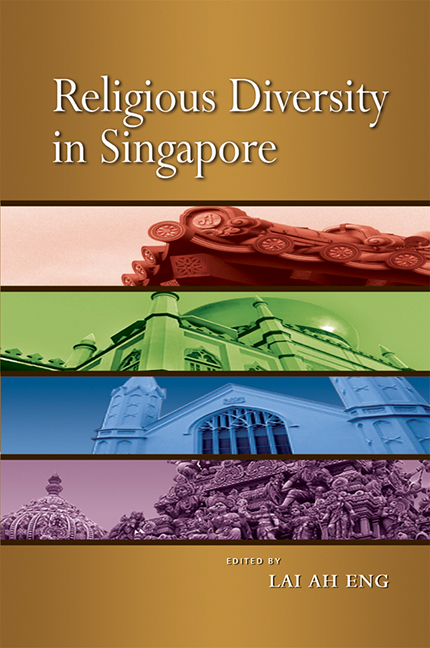Book contents
- Frontmatter
- Contents
- List of Figures and Tables
- List of Appendices
- FOREWORD
- PREFACE
- Acknowledgements
- The Contributors
- Abbreviations
- Glossary
- INTRODUCTION
- PART I The Landscape of Religious Diversity
- 1 Religious Influences and Impulses Impacting Singapore
- 2 Religious Trends and Issues in Singapore
- 3 Keeping God in Place: The Management of Religion in Singapore
- 4 Discourses on Islam in Southeast Asia and Their Impact on the Singapore Muslim Public
- 5 Global Christian Culture and the Antioch of Asia
- 6 “Religiously-inspired”, “India-derived” Movements in Singapore
- 7 Baha'is in Singapore: Patterns of Conversion
- 8 Diversities and Unities: Towards a Reformist Buddhism in Singapore
- 9 The Sathya Sai Baba Movement in Singapore: Its Service Mission and Philosophy of Communal Identity Construction
- 10 The Muslim Religious Elite of Singapore
- 11 The Evolution of the Sikh Identity in Singapore
- 12 Religious Processions: Urban Politics and Poetics
- PART II Religion in Schools and Among the Young
- PART III Religion in the Media
- PART IV Religious Organizations in Social Services
- PART V Interfaith Issues and Interaction
- Index
10 - The Muslim Religious Elite of Singapore
from PART I - The Landscape of Religious Diversity
Published online by Cambridge University Press: 21 October 2015
- Frontmatter
- Contents
- List of Figures and Tables
- List of Appendices
- FOREWORD
- PREFACE
- Acknowledgements
- The Contributors
- Abbreviations
- Glossary
- INTRODUCTION
- PART I The Landscape of Religious Diversity
- 1 Religious Influences and Impulses Impacting Singapore
- 2 Religious Trends and Issues in Singapore
- 3 Keeping God in Place: The Management of Religion in Singapore
- 4 Discourses on Islam in Southeast Asia and Their Impact on the Singapore Muslim Public
- 5 Global Christian Culture and the Antioch of Asia
- 6 “Religiously-inspired”, “India-derived” Movements in Singapore
- 7 Baha'is in Singapore: Patterns of Conversion
- 8 Diversities and Unities: Towards a Reformist Buddhism in Singapore
- 9 The Sathya Sai Baba Movement in Singapore: Its Service Mission and Philosophy of Communal Identity Construction
- 10 The Muslim Religious Elite of Singapore
- 11 The Evolution of the Sikh Identity in Singapore
- 12 Religious Processions: Urban Politics and Poetics
- PART II Religion in Schools and Among the Young
- PART III Religion in the Media
- PART IV Religious Organizations in Social Services
- PART V Interfaith Issues and Interaction
- Index
Summary
INTRODUCTION
Background of the Muslim Religious Elite
It is generally understood that there is no clergy in Islam. What exists is a body of religious elite called the ulama that provides leadership in matters pertaining to religious belief and practices in the Muslim community. It is maintained that their emergence is the result of social necessity as there is hardly any system of belief that does not comprise a group of individuals forming a class of the selected few whose task is to provide leadership in that aspect.
The ulama exercise considerable influence in Muslims’ religious and cultural life. By virtue of their training in the religious sciences, they believe that they are the spiritual and intellectual custodians of Islam. Hence they define problems affecting the community which they regard as falling within the ambit of the religion. They also attempt to provide solutions based on what they consider as the divine law. Generally the Muslim community perceives the ulama as pious and the authority on everything connected with Islam. Many are revered for their devotion, concern for Muslim solidarity and propagation of the virtues of Islamic teachings and values.
The ulama propagate their ideas and teachings through established religious institutions such as the madrasah. They also conduct organized religious classes, either in mosques or within the confines of private homes. Their thoughts are also disseminated via the mass media by way of regular contributions to television and radio programmes and the Internet. Pages or columns in the Malay daily also publish their writings at least twice a week. Their sermons and writings on Islam are sold commercially in the form of tapes and printed materials. Furthermore, they are often invited to speak at religious forums and seminars organized for the Muslim public by various Malay-Muslim organizations. Amongst them are leaders of tarikat (Arabic meaning “way”) or religious orders. Individuals and groups including Malay leaders and professionals encourage their participation in the Malay-Muslim community's affairs over issues ranging from education to the problems of the Knowledge Based Economy (KBE). Moreover, they are consulted and their advice sought by members of the community on numerous matters, including family life and marital conflicts; parenting, various social problems like delinquency, drug addiction, teenage pregnancies and marriage and illnesses of sorts, to name a few.
- Type
- Chapter
- Information
- Religious Diversity in Singapore , pp. 248 - 274Publisher: ISEAS–Yusof Ishak InstitutePrint publication year: 2008



